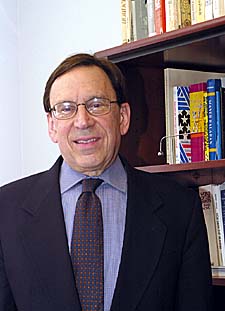|
This is an archived article.
For the latest news, go to the
Advance Homepage
For more archives, go to the Advance Archive/Search Page. | ||
|
Sociologist Studies Jewish Identity There are roughly the same number of Jews in Israel and the United States - more than five million in each country. But the relationship of Jews both to each other and to the rest of the society is vastly different in the two countries, says Arnold Dashefsky, a professor of sociology and the director of UConn's Center for Judaic Studies and Contemporary Jewish Life.
That is because Jews are 80 percent of the Israeli population but only two percent of the American population, Dashefsky and his co-authors note in a forthcoming article, "A Journey of the 'Straight Way' or the 'Roundabout Path:' Jewish Identity in the United States and Israel," recently published in Handbook of the Sociology of Religion. "The relationship between Jews within Israel is affected by the fact that Jews constitute the majority population," Dashefsky and his co-authors write. "In contrast with societies in which Jews are but a small minority, little consideration has to be given to Jewish identity in Israel. It is largely taken for granted." After writing about the Jewish community for more than 30 years, Dashefsky is a well-regarded expert on Jewish identity. In addition to heading the University's Judaic Studies Center, he is active in the Association for the Social Scientific Study of Jewry and the Association for Jewish Studies. Most of his forthcoming work attempts to assess the current state of Jewish identity. "There's much concern about the issue of Jewish identity," says Dashefsky. "Jews have been welcomed in American society at large, but the consequence of that is that people are less interested in their Jewish heritage." The article explores the evolution of the way in which Jewish identity is conceptualized. "Jewish identity is no longer a straight line," Dashefsky says. "In the past generation, people's path to Jewish identity has become more circuitous. My research suggests that people can jump around, which is a function of the fluidity of contemporary American life." The historical definition of Jewish identity, as found in religious law, states that a person born to a Jewish mother or one who converts to Judaism is Jewish. But the sociological definition differs, notes Dashefsky, in that Jewish identity is based on the congruence of an individual's own definition and that of others. There is great complexity in defining what it is to be Jewish, he says. This also stems from the fact that Jewish identity contains elements of ethnicity as well as religion. The balance between the two varies, depending on the society in which the person lives. In the United States, Dashefsky notes, Jewish people are de-emphasizing their ethnicity, and increasing ties to their religion. "In the United States," he says, "while assimilation and secularization continue, there is a growing interest among some in increased ritual observance." Jews in Israel are experiencing the opposite effect. As the major ethnic subgroups of Israel's Jewish population assimilate and intermarry, where one's ancestors came from will be of less concern. "Along with this trend toward the mixing of ancestry is the negative reaction to Israeli religious orthodoxy, which leads to a decreased religiosity and increased ethnicity in Israeli Jewish life," Dashefsky and his colleagues write. Dashefsky and his co-authors also found other differences between Israeli and American Jews. By examining factors such as synagogue attendance and the observance of religious laws at home, they found that Israeli Jews of Middle Eastern descent are the most religious, followed by Israeli Jews of European descent and American Jews. They also discovered that Israeli Jews who are not religious have more home religious practices than do non-religious American Jews. As with many other differences, that can be attributed to the fact that Jews are the majority in Israel. The authors suggest that researchers and Jewish people should examine the tendency of Jews in America to be subsumed by the larger culture. "American Jews continue to assimilate and are becoming more and more like other citizens of the United States. This development appears as a decreasing sense of ethnicity," Dashefsky and his colleagues write. "What differentiates Jews in the United States from others are their religious activities and ideology." Adds Dashefsky, "The current cultural climate supporting pluralism and multiculturalism creates opportunities for minority religious and ethnic groups to seek a balance between complete assimilation and total segregation of social and cultural life." |

